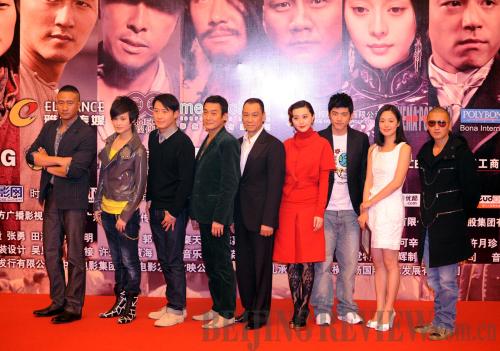|
 |
|
BLOCKBUSTER: A press conference for the premiere of Bodyguards and Assassins, a Hong Kong/mainland action film that features an all-star cast, on December 14, 2009 (JI GUOQIANG) |
Beijing movie theaters posted notices around the New Year holiday that reminded audiences to avoid the flood of crowds flocking to the cinema. Many Shanghai cinema owners complained about a lack of screens—if they had more, they would have earned bigger box office returns.
"Around every New Year we have the same trouble—there are too many blockbusters and not enough time for cinemas to fully digest them," said Wu Hehu, a manager at Shanghai United Circuit.
Three movies debuted on November 20, 2009, to be running through the winter movie-going season. Chinese Lunar New Year falls on February 14, Valentine's Day in the West, and many of the movies that hit the holiday screen were love-related. More than 50 movies were scheduled for release around the 90-day period that includes Christmas, New Year's Day, the Spring Festival and Valentine's Day.
Among the holiday season's blockbusters is Avatar by James Cameron, whose movie, Titanic, earned a record-breaking 360 million yuan ($53 million) in China 11 years ago. That record was not broken until August 2009's Transformers 2: Revenge of the Fallen brought in 430 million yuan ($63 million). But the new record was broken in just three months by apocalyptic 2012, which garnered 453 million yuan ($67 million).
"The rapid expansion of the cinema market contributed to the fast new box office records," said Assistant Manager Gao Jun of the Beijing Xinyinglian Cinema Circuit.
Cinemas in China used to contain just one screen, but the number has been increasing and yet there are still not enough to accommodate the glut of movies. Screens have risen from nearly 2,000 nationwide in 1998 to 4,800 today.
It was a big year for Chinese cinema in 2009, both in terms of movie production and sales. Statistics show that box office earnings hit 6 billion yuan ($882 million), an increase of 40 percent over 2008's 4.3 billion yuan ($632 million). In 2008, China was put into the world's top 10 box office earners for the first time.
China's cinema has been around for a century, but the country is just now entering its golden age and making real profit. The industry has gone through hard times—weak audience turnout, bleak box office numbers and studio owners worrying about paying employee salaries. It had major problems under yesteryear's planned economy.
In March 1993, officials worked out a guideline to help the industry out. Companies working in movie production, distribution and screening adjusted to the new socialist market-oriented economy; movies were to be considered cultural products and audiences comprised the market; and social and economic achievements were to be considered when evaluating the theater market.
 |
|
BLUE WORLD: A scene from the holiday season blockbuster Avatar (CFP) |
A decade passed and the guideline was declared invalid but industry reform deepened, showing the government's resolution to develop the market.
Tong Gang, Director of the film bureau of the State Administration of Radio, Film and Television (SARFT), said during an October 2009 movie summit that state policies are being made in favor of movie industry development. Filming license approval has been simplified, special funds have been established to support the industry and international cooperation is being encouraged.
"To foster a better and faster theater industry, another set of guidelines is to come out that will offer more positive policies," said Tong. "The 6-billion-yuan box office is just a beginning. The box office will break 10 billion yuan ($1.5 billion) in three years."
Tong expects screens to exceed 20,000 to 30,000 in the coming decade and annual box office revenues to hit 30 billion yuan ($4.4 billion) to 50 billion yuan ($7.3 billion). "That's the size of the pie that will live up to the market scale of China's population," Tong said.
| 